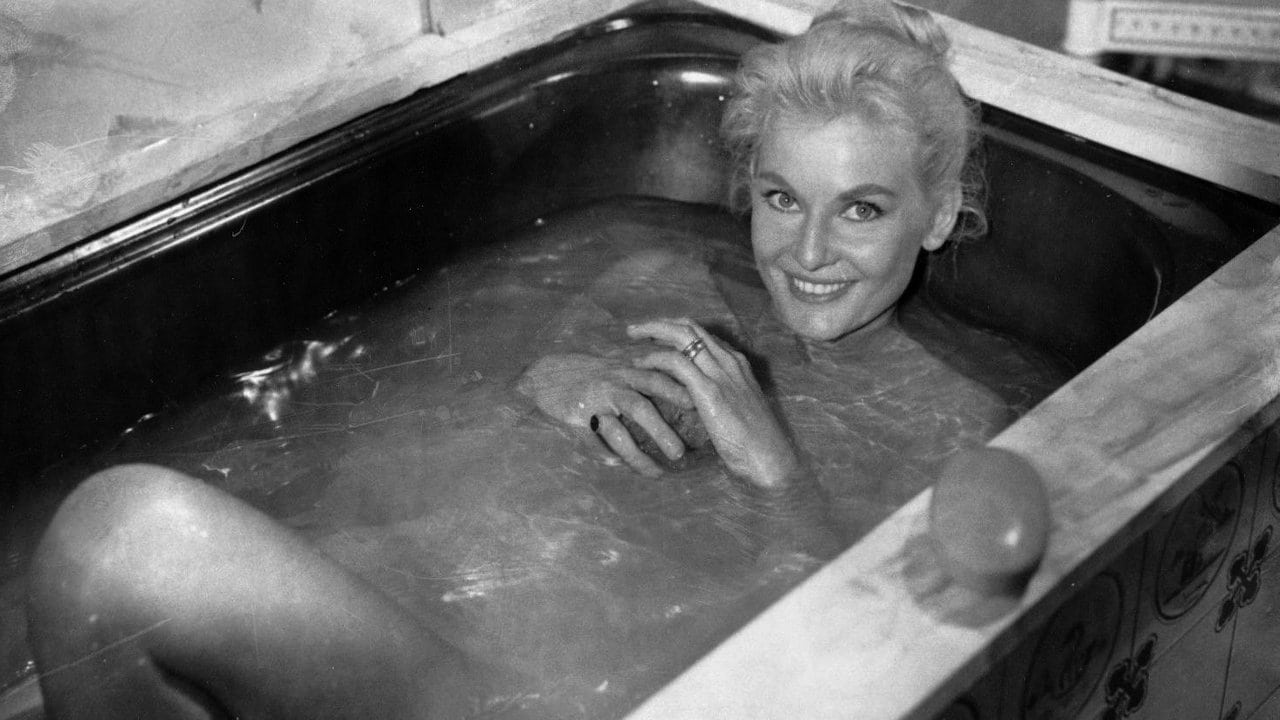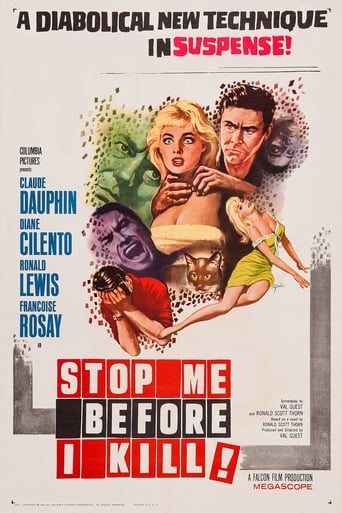

Obscure Hammer Psychological Thriller Written and Directed by Val Guest.Suffering a Head Injury resulting from a Car Crash, a Race Car Driver (Ronald Lewis) Cannot Perform on His Honeymoon and on top or that is Haunted by a Lust to Kill His New Bride (Diane Cilento).He has Black Outs and is Forever Fighting the Urge, and eventually seeks a Psychiatrist (Claude Dauphin), a Friend of His New Bride.1960 saw a Trend in "Psycho" Pictures and Hammer joined in Immediately. This being a Val Guest Film there are a Number of Interesting Camera Flourishes and is a Fun Film to Watch.But the Fun is Interrupted Frequently by Repetitive Scenes and some Mysterious Things that Astute Viewers won't find that Mysterious.Good Acting from the International Cast but They bring Heavy Accents to the Dialog, and there is a Lot of Dialog, and it can become Wearisome. The Extended Length (107-120 min depending) Doesn't Help as the Story tends to Lumber and Stretch the Plot beyond its B-Movie Capacity to Sustain.Overall, Worth a Watch, but Ultimately Talky, Heavy Handed and the Constant Changing Tone that is a Result of the Protagonist's Confusion and the Fighting and Making Up, Fighting and Making Up, becomes Tedious. It's Burdensome at times and tends to make the Movie more Irritating than Intriguing.
... View MoreI think I would have enjoyed this story better if I'd read the novel it is based on ("The Full Treatment") or as a radio drama play that trimmed down the extraneous elements and didn't exhaust my patience the way this movie does. The story had promise (in spite of a psychological premise that hasn't aged well since 1960), but in the end the director and the writer couldn't quite make it work.There is some excellent stuff here and there - I think that the opening shot that pulls back from a car radio playing a happy tune to seamlessly reveal a scene of disaster and carnage is good enough to redeem the problems with the remaining 2 hours of screenplay. But there's an awful lot to get through in the next 2 hours, and a lot of it is a slog.I've liked Ronald Lewis since I saw his role as the chauffeur in another Hammer production, "Scream of Fear!", and I when I saw that he was going to be prominently featured in this one, I was looking forward to seeing him stretch out. But his character is high-strung and unlikeable (even though it seems that his terrible behavior is caused by what we would now call "Post Traumatic Stress Disorder") and sometimes the director can't get him off the screen fast enough for me. Lewis is out there front and center, chewing the scenery in a thankless role and I can't help but wonder if this picture damaged his career, or at least slowed it down some. The other problem, of course, is that the whole "repressed memories leading to murder" thing has lost most of its credibility over the decades, sapping some of the drama and energy from the proceedings on screen. As this tale of psychodrama among the jet-set spins out, the thought kept intruding - "This has nothing to say to my life". Oddly, that never comes up in "Scream Of Fear!", possibly because the heroine is a "poor little rich girl" who is wheelchair bound and seemingly fragile. But the black and white photography is crisp.There are some great visual setups (oddly, the driving scenes are the least convincing scenes in the movie, ironic considering the Lewis' character is a race car driver). Diane Cilantro is adorable and a pleasure to simply behold (although her character is missing from the middle third of the movie).And there is a fascinating contribution from Francois Rosay who is on screen for maybe 5 minutes altogether, but who pulls the final climax together with a wordless performance that is in some ways the strongest in the movie. So, did I like it? Not nearly as much as the similar "Scream Of Fear!". Did the movie have a lot of things to redeem the problems with the plot and the unlikeable protagonist? You bet.
... View MoreAt 108 minutes, the Hammer production "Stop Me Before I Kill!" is one of the longest movies that they made. It's a rather meaty story, and serves as a major showcase for three of its main actors, but isn't that satisfying overall. Written by producer & director Val Guest and author Ronald Scott Thorn, based on the latters' novel "The Full Treatment", it tells of a British race car driver, Alan Colby (Ronald Lewis), and his lovely Italian wife Denise (Diane Cilento), vacationing in France some time after a bad traffic accident in which the other driver had died. Alan fears for his sanity, and is now worried that he may have developed homicidal intentions towards his wife. They make the acquaintance of an eminent French psychiatrist, David Prade (Claude Dauphin), who attempts to help Alan deal with his issues.This could and should have been a little more involving, as the premise is not bad and it's entertaining enough in watching psychiatric methods being employed. But the script by Guest and Thorn is so heavily laden with dialogue that it barely gives the story (not to mention the actors) a chance to breathe. It does have some good dialogue, and starts to go for more interesting visuals in its final third. The on location shooting, of course, is impeccable, which, along with the Megascope photography, helps to make the picture pleasant enough to look at. (To say nothing of sexy blonde Cilento). Dauphin, Cilento, and Lewis are all fine, and they're ably supported by Francoise Rosay as Prades' mother, and Bernard Braden as Colby's friend Harry. The filmmaking is pretty slick; it's just too bad that the scenario can't generate more suspense.Certainly worth a look for devoted Hammer followers, but not one of their best.Six out of 10.
... View More"Stop Me Before I Kill" or "The Full Treatment" is a 1960 film with a screenplay by Val Guest, who also directed.The story concerns a famous race car driver, Alan Colby (Ronald Lewis), who was involved in a terrible car crash with his wife Denise (Diane Cilento). He is unable to race, and he and Denise go to the south of France on vacation.Alan goes through swift mood shifts - the slightest word can set off his temper. And he keeps being tempted to strangle his wife - in fact, he nearly does a couple of times. This, of course, is where one has to suspend belief because why the heck would she stay with someone who has attempted to strangle her and whose temper flares at the drop of a hat? I understand women in abusive situations, but I don't know, my husband trying to kill me takes it to a new level.A psychiatrist they meet, Dr. David Prade (Claude Dauphin) offers to help. Alan is hesitant, but once back in London, where Prade has also returned, he agrees. At the end of the treatment, he feels that he is cured. He is able to get back on the racing track and has no temptation to hurt Denise.Right before he is to leave for a race, Alan wakes up and finds that Denise is not there. In fact, all the evidence points to the fact that she has been murdered. This was a very good story that suffered from an unbalanced script. The film went on too long, and the psychiatric scenes were endless. Diane Cilento is a beautiful and heartfelt Denise, Claude Dauphin is likable, and Ronald Lewis for me lacked subtlety in a difficult role. A good-looking man, in the beginning of the film, he reminded me of David Hasselhoff; fortunately, the resemblance faded somewhat.Sadly Ronald Lewis committed suicide in 1982, bankrupt and his career in the doldrums.In other hands and a bigger budget, this could have been an excellent film. However it's worth seeing for the story.
... View More